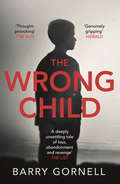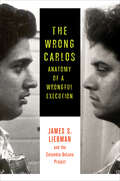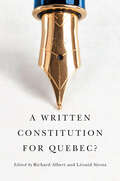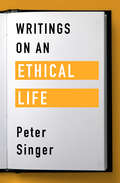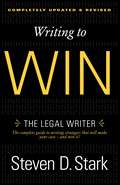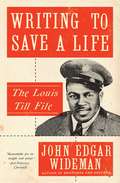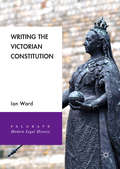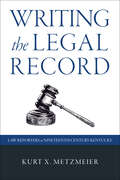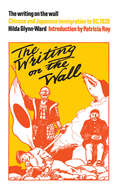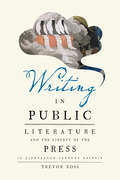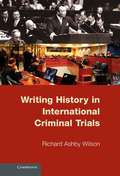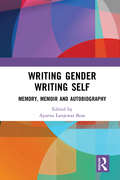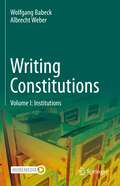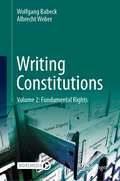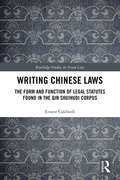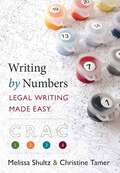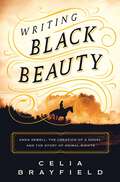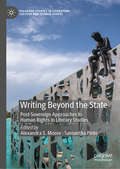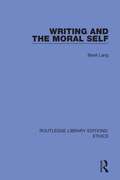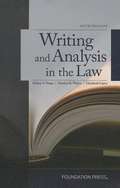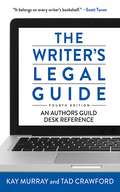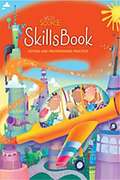- Table View
- List View
The Wrong Child: A gripping thriller you won't be able to put down
by Barry GornellHow far would you go to protect your child?When tragedy strikes in a small Scottish village, everyone in the community is affected.Most people believe one child is to blame for what happened.But could a young boy really be responsible? And what lengths will his parents go to protect him?THE WRONG CHILD is the most thought-provoking novel of 2018, perfect for fans of WE NEED TO TALK ABOUT KEVIN by Lionel Shriver and MY ABSOLUTE DARLING by Gabriel Tallent.****************READERS ARE CALLING THE WRONG CHILD 'UNFORGETTABLE':'Amazing' - Amazon 5* review'A great page-turner!' Amazon 5* review'Hopefully it will receive the wider audience it so richly deserves' - Amazon 5* review'Challenges your notions and ideals of morality' - Amazon review'Will stick with you long after you finish it!' Amazon review****************What the critics are saying about THE WRONG CHILD:'A thought-provoking read' - THE SUN'Genuinely gripping' - THE HERALD'A study of guilt and grief' - DAILY MAIL'Brilliant, but dark as hell' - METRO'Astonishing' - PSYCHOLOGIES'So visceral it seeps into your pores' - DAILY RECORD'Stunning. Macabre, unsettling and beautifully poetic' - BRIAN CONAGHAN, Costa Award winning author
The Wrong Carlos: Anatomy of a Wrongful Execution
by James Liebman Shawn Crowley Andrew Markquart Lauren Rosenberg Lauren White Daniel ZharkovskyIn 1989, Texas executed Carlos DeLuna, a poor Hispanic man with childlike intelligence, for the murder of Wanda Lopez, a convenience store clerk. His execution passed unnoticed for years until a team of Columbia Law School faculty and students almost accidentally chose to investigate his case and found that DeLuna almost certainly was innocent. They discovered that no one had cared enough about either the defendant or the victim to make sure the real perpetrator was found. Everything that could go wrong in a criminal case did. This book documents DeLuna's conviction, which was based on a single, nighttime, cross-ethnic eyewitness identification with no corroborating forensic evidence. At his trial, DeLuna's defense, that another man named Carlos had committed the crime, was not taken seriously. The lead prosecutor told the jury that the other Carlos, Carlos Hernandez, was a "phantom" of DeLuna's imagination. In upholding the death penalty on appeal, both the state and federal courts concluded the same thing: Carlos Hernandez did not exist.The evidence the Columbia team uncovered reveals that Hernandez not only existed but was well known to the police and prosecutors. He had a long history of violent crimes similar to the one for which DeLuna was executed. Families of both Carloses mistook photos of each for the other, and Hernandez's violence continued after DeLuna was put to death. This book and its website (thewrongcarlos.net) reproduce law-enforcement, crime lab, lawyer, court, social service, media, and witness records, as well as court transcripts, photographs, radio traffic, and audio and videotaped interviews, documenting one of the most comprehensive investigations into a criminal case in U.S. history. The result is eye-opening yet may not be unusual. Faulty eyewitness testimony, shoddy legal representation, and prosecutorial misfeasance continue to put innocent people at risk of execution. The principal investigators conclude with novel suggestions for improving accuracy among the police, prosecutors, forensic scientists, and judges.
The Wrong Carlos: Anatomy of a Wrongful Execution
by James S. Liebman The Columbia DeLuna ProjectA Columbia Law School team&’s in-depth examination of one man&’s 1989 wrongful conviction and execution for murder. In 1989, Texas executed Carlos DeLuna, a poor Hispanic man with childlike intelligence, for the murder of Wanda Lopez, a convenience store clerk. His execution passed unnoticed for years until a team of Columbia Law School faculty and students chose to investigate his case and found that DeLuna almost certainly was innocent. No one had cared enough about either the defendant or the victim to make sure the real perpetrator was found. Everything that could go wrong in a criminal case did. DeLuna&’s conviction was based on a single, nighttime, cross-ethnic eyewitness identification with no corroborating forensic evidence. At his trial, DeLuna&’s defense—that another Carlos had committed the crime—was not taken seriously. The lead prosecutor told the jury that the other Carlos, Carlos Hernandez, was a &“phantom&” of DeLuna&’s imagination. In upholding the death penalty on appeal, both the state and federal courts concluded the same thing: Carlos Hernandez did not exist. However, he not only existed, but also had a long history of violent crimes . . . This book and its website (thewrongcarlos.net) reproduce law-enforcement, crime lab, lawyer, court, social service, media, and witness records, as well as court transcripts, photographs, radio traffic, and audio and videotaped interviews, documenting one of the most comprehensive investigations into a criminal case in US history. &“This book will become a classic in the field.&” —Austin Sarat, Amherst College &“[An] infuriating yet engrossing book on wrongful conviction...An important critique of our legal system.&” —Publishers Weekly
A Written Constitution for Quebec? (Democracy, Diversity, and Citizen Engagement Series)
by Richard Albert and Léonid SirotaNo province in Canada has codified a written constitution, and whether Quebec should be the first remains a controversial question. A Written Constitution for Quebec? enters into the debate, drawing a roadmap through the legal, political, and constitutional terrain of the issue. Leading scholars each take their own position in the debate, examining the issue from various sides and exploring the forms and limits of a codified Quebec constitution by asking whether Quebec should adopt a written constitution, how the province might go about it, and what such a document might achieve. Along with a comprehensive introduction to constitutional codification and how it relates to Quebec, the book opens with a proposal for a written constitution, with the analyses that follow expressing a diversity of views on the feasibility and desirability of a written constitution for the province. An array of perspectives through the lenses of Indigenous inclusion and reconciliation, interculturalism and democratic constitutionalism, and insights from other federal and plurinational states – are included in this wide-ranging volume. Taking a doctrinal, historical, theoretical, and comparative approach, A Written Constitution for Quebec? extensively addresses Quebec’s constitutional future in Canada.
Writings on an Ethical Life (Isnm Ser. #Vol. 138)
by Peter SingerThe essential collection of writings by one of the most visionary and daring philosophers of our time Since bursting sensationally into the public consciousness in 1975 with his groundbreaking work Animal Liberation, Peter Singer has remained one of the most provocative ethicists of the modern age. His reputation, built largely on isolated incendiary quotations and outrage-of-the-moment news coverage, has preceded him ever since. Aiming to present a more accurate and thoughtful picture of Singer's pioneering work, Writings on an Ethical Life features twenty-seven excerpts from some of his most lauded and controversial essays and books. The reflections on life, death, murder, vegetarianism, poverty, and ethical living found in these pages come together in a must-read collection for anyone seeking a better understanding of the issues that shape our world today. This ebook features an illustrated biography of Peter Singer, including rare photos from the author's personal collection.
Writing to Win: The Legal Writer
by Steven D. StarkFrom a master teacher, a results-oriented approach to powerful legal writing that communicates, that persuades--and that wins.Of all the professions, the law has the most deserved reputation for opaque, jargon-clogged writing. Legal education, which focuses on judicial opinions, not instruments of persuasion, is partly to blame. Yet forceful writing is one of the most potent weapons of legal advocacy. In Writing to Win, Steve Stark, a former teacher of writing at Harvard Law, who has taught thousands of aspiring and practicing lawyers, has written the only book on the market that applies the universal principles of vigorous prose to the job of making a case--and winning it.Writing to Win focuses on the writing of lawyers, not judges, and includes dozens of examples of effective (and ineffective) real-life writing--as well as models drawn from advertising, journalism, and fiction. It deals with the problems lawyers face in writing, from organization to strengthening and editing prose; teaches ways of improving arguments; addresses litigation and technical writing in all its forms; and covers the writing attorneys must perform in their practice, from memos and letters to briefs and contracts. Each chapter opens with a succinct set of rules for easy reference.No other legal writing book on the market is as practical, as focused on results, as well written as Writing to Win.From the Trade Paperback edition.
Writing to Save a Life: The Louis Till File (Canons #84)
by John Edgar WidemanAn award-winning writer traces the life of the father of iconic Civil Rights martyr Emmett Till--a man who was executed by the Army ten years before Emmett's murder. An evocative and personal exploration of individual and collective memory in America by one of the most formidable Black intellectuals of our time.In 1955, Emmett Till, aged fourteen, traveled from his home in Chicago to visit family in Mississippi. Several weeks later he returned, dead; allegedly he whistled at a white woman. His mother, Mamie, wanted the world to see what had been done to her son. She chose to leave his casket open. Images of her brutalized boy were published widely. While Emmett's story is known, there's a dark side note that's rarely mentioned. Ten years earlier, Emmett's father was executed by the Army for rape and murder. In Writing to Save a Life, John Edgar Wideman searches for Louis Till, a silent victim of American injustice. Wideman's personal interaction with the story began when he learned of Emmett's murder in 1955; Wideman was also fourteen years old. After reading decades later about Louis's execution, he couldn't escape the twin tragedies of father and son, and tells their stories together for the first time. Author of the award-winning Brothers and Keepers, Wideman brings extraordinary insight and a haunting intimacy to this devastating story. An amalgam of research, memoir, and imagination, Writing to Save a Life is completely original in its delivery--an engaging and enlightening conversation between generations, the living and the dead, fathers and sons. Wideman turns seventy-five this year, and he brings the force of his substantial intellect and experience to this beautiful, stirring book, his first nonfiction in fifteen years.
Writing the Victorian Constitution (Palgrave Modern Legal History Ser.)
by Ian WardThis book charts the writing of the English constitution through the work of four of the most influential jurists in the history of English constitutional thought—Edmund Burke, Thomas Babington Macaulay, Walter Bagehot and Albert Venn Dicey. Stretching from the French Revolution to the death of Queen Victoria, their writing is both representative of and formative to the Victorian constitution. Ian Ward traces how constitutional writing changed over the course of the long nineteenth century, from the poetics of Burke and the romance of Macaulay, to the pragmatism of Bagehot and the jurisprudence of Dicey. A century on, our perception of the English constitution is still shaped by this contested history.
Writing the Legal Record: Law Reporters in Nineteenth-Century Kentucky
by Kurt X. MetzmeierAny student of American history knows of Washington, Jefferson, and the other statesmen who penned the documents that form the legal foundations of our nation, but many other great minds contributed to the development of the young republic's judicial syst
The Writing on the Wall
by Hilda Glynn-Ward Patricia RoyWith tales of a gruesome murder, a typhoid epidemic, corrupt politicians, and a Japanese invasion, The Writing on the Wall was intended to shock its readers when it was published in 1921. Thinly disguised as a novel, it is a propaganda tract exhorting white British Columbians to greater vigilance to prevent greedy politicians from selling out to the Chinese and Japanese. It was also designed to convince eastern Canada of British Columbia's need for protections against an onslaught of the 'yellow peril.'This novel is not exceptional in its extreme racism; it reiterates almost every anti-oriental cliché circulating in British Columbia at the time of its publication. While modern readers will find the story horrifying and unbelievable, it is in fact based on real incidents. Many of the views expressed were only exaggerated versions of ideas held throughout the country about non-Anglo-Saxon immigrants. The Writing on the Wall is a vivid illustration of the fear and prejudice with which immigrants were regarded in the early twentieth century.
Writing in Public: Literature and the Liberty of the Press in Eighteenth-Century Britain
by Trevor RossWhat is the role of literary writing in democratic society?Building upon his previous work on the emergence of "literature," Trevor Ross offers a history of how the public function of literature changed as a result of developing press freedoms during the period from 1760 to 1810. Writing in Public examines the laws of copyright, defamation, and seditious libel to show what happened to literary writing once certain forms of discourse came to be perceived as public and entitled to freedom from state or private control. Ross argues that—with liberty of expression becoming entrenched as a national value—the legal constraints on speech had to be reconceived, becoming less a set of prohibitions on its content than an arrangement for managing the public sphere. The public was free to speak on any subject, but its speech, jurists believed, had to follow certain ground rules, as formalized in laws aimed at limiting private ownership of culturally significant works, maintaining civility in public discourse, and safeguarding public deliberation from the coercions of propaganda. For speech to be truly free, however, there had to be an enabling exception to the rules. Since the late eighteenth century, Ross suggests, the role of this exception has been performed by the idea of literature. Literature is valued as the form of expression that, in allowing us to say anything and in any form, attests to our liberty. Yet, paradoxically, it is only by occupying no definable place within the public sphere that literature can remain as indeterminate as the public whose self-reinvention it serves.
Writing History in International Criminal Trials
by Richard Ashby WilsonWhy do international criminal tribunals write histories of the origins and causes of armed conflicts? Richard Ashby Wilson conducted research with judges, prosecutors, defense attorneys and expert witnesses in three international criminal tribunals to understand how law and history are combined in the courtroom. Historical testimony is now an integral part of international trials, with prosecutors and defense teams using background testimony to pursue decidedly legal objectives. In the Slobodan Milošević trial, the prosecution sought to demonstrate special intent to commit genocide by reference to a long-standing animus, nurtured within a nationalist mindset. For their part, the defense called historical witnesses to undermine charges of superior responsibility, and to mitigate the sentence by representing crimes as reprisals. Although legal ways of knowing are distinct from those of history, the two are effectively combined in international trials in a way that challenges us to rethink the relationship between law and history.
Writing Gender Writing Self: Memory, Memoir and Autobiography
by Aparna Lanjewar BoseLife Writings/Narratives and studies in gender have been posing critical challenges to fetishizing the manner of canon formations and curriculum propriety. This book engages with these and other challenges turning our customary gaze towards women especially marginal, enabling us to interrogate the established pedagogical practices that accentuates the continuing denial of their agency. Reproduction of the cultural modes of narrativization based on memory and experience becomes a mode of reclaiming the agency. These challenge the homogenising singularity of communitarian notions besides dominant gender constructs using visual, textual, popular, historical, cultural and gender modes enabling one to rethink our received theoretical frameworks. This edited volume brings together 21 essays on life writings produced by both well-established and emerging writers in the field of literature written by scholars from countries like India, Pakistan, China, USA, Iran, Yemen and Australia, to name just a few. Many of the essays in this book focus on how the progress of the self is often impeded by the society it finds itself in. With an enlightening foreword by Dr. E.V. Ramakrishnan and a detailed, critical introduction by Aparna Lanjewar Bose, this anthology is useful for all those who wish to learn more about this genre of writing.
Writing for Hire
by Catherine L. FiskProfessional writers may earn a tidy living for their work, but they seldom own their writing. Catherine Fisk traces the history of labor relations that defined authorship in film, TV, and advertising in the mid-twentieth century, showing why strikingly different norms of attribution emerged in these overlapping industries.
Writing Constitutions: Volume I: Institutions
by Wolfgang Babeck Albrecht WeberWriting Constitutions intends to serve as a practical manual for those writing constitutions or interested in their design. It is the first systematic and universal approach to coherently capture concepts and contents of a modern constitution. Volume I breaks each constitutional mechanism into components and offers detailed designs to draft a constitutional clause. This provides lawmakers with the necessary toolkit for writing constitutions and empowers them to strengthen democracies. Writing Constitutions comes in three volumes:- Volume I: Institutions- Volume II: Fundamental Rights- Volume III: Constitutional Principles
Writing Constitutions: Volume 2: Fundamental Rights
by Wolfgang Babeck Albrecht WeberWriting Constitutions intends to serve as a practical manual for those writing constitutions or interested in their design. It is the first systematic and universal approach to coherently capture concepts and contents of a modern constitution. Volume II is a user-friendly guide covering the current best practice in human rights and contains a draft catalogue of human rights. It empowers judges, lawyers, civil rights activists, legislators, and academics to draft and interpret over 70 Human Rights and strengthen democracies. Writing Constitutions comes in three volumes:- Volume I: Institutions- Volume II: Fundamental Rights- Volume III: Constitutional Principles
Writing Chinese Laws: The Form and Function of Legal Statutes Found in the Qin Shuihudi Corpus (Routledge Studies in Asian Law)
by Ernest CaldwellThe legal institutions of the short-lived Qin dynasty (221–207 BCE) have been vilified by history as harsh and draconian. Yet ironically, many Qin institutional features, such as written statutory law, were readily adopted by subsequent dynasties as the primary means for maintaining administrative and social control. This book utilizes both traditional texts and archeologically excavated materials to explore how these influential Qin legal institutions developed. First, it investigates the socio-political conditions which led to the production of law in written form. It then goes on to consider how the intended function of written law influenced the linguistic composition of legal statutes, as well as their physical construction. Using a function and form approach, it specifically analyses the Shuihudi legal corpus. However, unlike many previous studies of Chinese legal manuscripts, which have focused on codicological issues of transcription and translation, this book considers the linguistic aspects of these manuscripts and thus their importance for understanding the development of early Chinese legal thought. Writing Chinese Laws will be useful to students and scholars of Chinese Studies, as well as Asian law and history more generally.
Writing By Numbers: Legal Writing Made Easy
by Melissa Shultz Christine TamerGiven the reality that legal writing is difficult for most new law students, Writing by Numbers: Legal Writing Made Easy aims to demystify the writing process by providing concrete formulas for mastering objective and persuasive legal writing. Put simply, at each juncture of your journey to become a proficient legal writer, this book gives you a roadmap to follow, broadly starting with the macro-formula CRAC (Conclusion, Rule, Analysis, and Conclusion) and then moving to micro-formulas for each part of the macro formula. The goal is that you will never find yourself lost―that is, you will never find yourself facing an entirely blank page without direction.
Writing Black Beauty: Anna Sewell, the Creation of a Novel, and the Story of Animal Rights
by Celia BrayfieldThe story of a remarkable woman who wrote a novel that not only became a classic, but also changed the way human society views and treats animals. Born in 1829 to a young Quaker couple, Anna Sewell grew up in poverty in London. She was fourteen when she fell and injured her ankle, which left her permanently disabled. Rejecting the life of a Victorian invalid, she developed an extraordinary empathy with horses, learning to ride side-saddle and to drive a small carriage. Rebellious and independent-minded, Anna suffered periods of severe depression as a young woman. She left the Quaker movement, but remained close friends with the women writers and abolitionists who had been empowered by its liberal principles. It was not until she became terminally ill, aged 51, that she found the courage to write her own book. Tragically, she died just five months after the book was published in 1877. Black Beauty is now recognised as the first anthropomorphic novel, and it had an extraordinary emotional impact on readers of all ages. After modest success in Britain, it was taken up by a charismatic American, George Thorndike Angell, a campaigner against animal cruelty who made it one of the bestselling novels of all time. Using newly discovered archive material, Celia Brayfield shows Anna Sewell developing the extraordinary resilience to overcome her disability, rouse the conscience of Victorian Britain and make her mark upon the world.
Writing Beyond the State: Post-Sovereign Approaches to Human Rights in Literary Studies (Palgrave Studies in Literature, Culture and Human Rights)
by Samantha Pinto Alexandra S. MooreThis book investigates the imaginative capacities of literature, art and culture as sites for reimagining human rights, addressing deep historical and structural forms of belonging and unbelonging; the rise of xenophobia, neoliberal governance, and securitization that result in the purposeful precaritization of marginalized populations; ecological damage that threatens us all, yet the burdens of which are distributed unequally; and the possibility of decolonial and posthuman approaches to rights discourses. The book starts from the premise that there are deep-seated limits to the political possibilities of state and individual sovereignty in terms of protecting human rights around the world. The essays explore how different forms, materials, perspectives, and aesthetics can help reveal the limits of normative human rights and contribute to the cultural production of new human rights imaginaries beyond the borders of state and self.
Writing and the Moral Self
by Berel LangOriginally published in 1991, this book analyses the relation between writing and ethics in a number of social contexts – in politics, as language discloses its connections to the institutions of totalitarianism and democracy; in the university, as contemporary scholarly ideals find an uncomfortably accurate representation in the stylistic forms of academic writing; in daily social practice, ranging from the status of truth in journalistic writing to the connection between pronouns and affirmative action; and finally in the ethical structure of language itself.
Writing and Analysis in the Law, Sixth Edition
by Helene S. Shapo Marilyn R. Walter Elizabeth FajansA standard-setter in American legal education, Writing and Analysis in the Law provides a guide to legal writing, focusing on the importance of clear organization in written communications. Developed as a textbook for a first-year law school course, and is successful in courses for foreign LLM students, the book introduces law students to analyzing and writing about legal authority in cases and statutes. It discusses the structure and persuasive techniques of effective argumentation. The book makes effective use of high-quality and illustrative examples and writing exercises. It also includes access to helpful PowerPoint slides for use in the classroom and class preparation. Lucid, compact, and up-to-date, this work consistently draws acclaim in law schools across the country. <P><P>The sixth edition has been streamlined and designed to be reader friendly: it uses white space, bullet points, tabulation, and headings that chunk information to enable student to grasp information efficiently.
The Writer's Legal Guide, Fourth Edition: An Authors Guild Desk Reference
by Kay Murray Tad CrawfordIn an increasingly digitized and complex publishing world, writers need to know how to protect themselves against copyright infringement, legal trouble, and unwise concessions to publishers. Still the author's foremost advocate for copyright protection, fair contracts, and free expression, the Authors Guild has once again partnered with Allworth Press to update this invaluable reference. Thoroughly revised to reflect the many changes in the publishing industry, the fourth edition offers plain-English explanations of legal and business aspects of the trade, from electronic rights and ebooks to contracts and accounting. Other topics include: Registering copyrights, including onlineTaxes and bookkeepingFollowing fair use guidelinesNegotiating contracts with publishers and agentsObtaining permissions to use others' workDealing with periodical, syndication, film, television, play, and audio rights agreementsHandling business disputesUnderstanding libel, privacy, and the limits of free expressionAvoiding self-publishing misstepsPlanning authors' estates
Write Source Skills Book Grade 3
by Pat Sebranek Dave KemperThis Skills Book Grade 3 contains 1)Proofreading Activities: Using Punctuation, Checking Mechanics, Checking Your Spelling, Using the Right Word 2) Sentence Activities: Sentence Basics, Sentence Problem, Sentence Combining, and 3) Language Activities: Nouns, Pronouns, Verbs, Adjectives and Adverbs, Prepositions Conjunctions Interjections, Parts of Speech.
